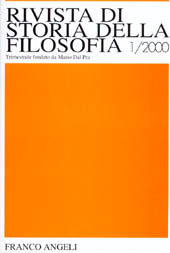The Doctrine of Intelligence in John Wenck's Commentary on the Liber de causis
523-548 p.
The paper reconstructs methods, sources, and doctrinal contents of John Wenck's commentary on the Liber de causis and focuses, in particular, on Wenck's interpretation of the theory of intelligences. The research perspective of the analysis is twofold. First, it aims to clarify Wenck's positioning in the commentary tradition of the Liber de causis, with reference to his two main models: Albert the Great and Thomas Aquinas. Albert's influence as an exegetical guide proves crucial; Wenck's interpretation shows, however, a distinct autonomy from Albert's paraphrasing of the Liber de causis and bears witness to a somewhat ambiguous and tacit use of Aquinas' commentary. Second, the paper relates Wenck's doctrine to the teachings of the Albertist masters active in Paris during the first decades of the fifteenth century: John of Nova Domo, Heymeric of Campo, and Lambert of Monte
The commentary on the Liber de causis attests to Wenck's adherence to the basic tenets of the so ÂÂcalled Albertist school. At the same time, Parisian Albertism emerges as a multifaceted constellation of positions characterised by a varied reception of both the Liber de causis and Albert's authority. [Publisher's Text]
-
store_in_same_fr
-
information
doiCode: 10.3280/SF2024-003003
issn: 1972-5558
KEYWORDS
- Neoplatonism, Albertism, Thomism, Liber de causis, Johannes Wenck, Heymericus de Campo, Albertus Magnus, Thomas Aquinas, Nicholas of Cusa


